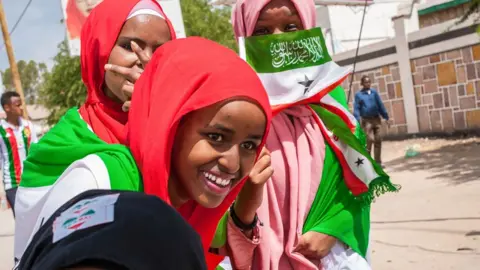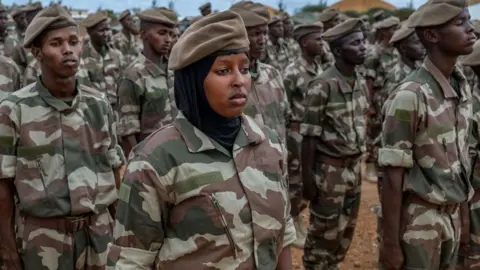
 Agence France-Presse
Agence France-PresseMany people in Somaliland are convinced that the United States, under the incoming presidency of Donald Trump, is about to become the first country in the world to recognize the unilaterally declared republic.
The region declared its independence 33 years ago after Somalia descended into civil war – and since then, the region has become a de facto nation-state.
“Donald is our savior,” says university student Aisha Ismail, whose voice trembles with joy at this prospect. “He is a wise and practical man. God bless America.”
She is speaking to me from Hargeisa, the capital of Somaliland, a city 850 kilometers (530 miles) north of Mogadishu, the seat of the Somali government.
For those who live in Mogadishu, Somaliland is an integral part of Somalia.
“I doubt Donald Trump knows what Somaliland is, let alone where it is,” says Abdi Mohamud, a data analyst in Mogadishu, his voice beginning to shake.
“I'm spitting fire.”
He is very angry because Ms. Ismail's high expectations are not necessarily just a pipe dream, at least in the long run.
Powerful and influential Republicans are pushing for the same, including Congressman Scott Perry, who filed last month A bill proposing formal US recognition of Somaliland.
This came after it was published in April 2023 Project 2025a road map for Trump's second presidency compiled by the prominent right-wing Heritage Foundation and more than 100 other conservative organizations
The document mentions only two African territories in its sub-Saharan Africa section – Somaliland and Djibouti – and proposes “recognition of Somaliland as a hedge against the deteriorating US position in Djibouti.”
However, the fact that sub-Saharan Africa takes up less than two pages in the more than 900-page plan suggests that the continent ranks very low on the priority list.
There is also no guarantee that the next administration will follow the plan, some of which Trump has already disavowed.
But one thing is clear. The United States has already begun to change its position on Somaliland, moving away from its Mogadishu-focused approach, known as the “one track” policy in Somalia.
Somalia has cost the United States dearly in financial, resource, and human terms since the early 1990s, when the bodies of 18 American soldiers were dragged through the streets of Mogadishu after Somali clan fighters shot down American helicopters.
The battle, known as “Black Hawk Down,” was the worst in American history in terms of casualties since the Vietnam War.
Somali Minister of State for Foreign Affairs Ali Omar Balad says: “Any move towards recognizing Somaliland’s independence would not only conflict with Somalia’s sovereignty, but would also destabilize the region by setting a dangerous precedent.”
The African Union and other world powers believe that territorial integrity is of paramount importance. Recognizing Somaliland could trigger a chain reaction with separatists around the world demanding recognition of the territory they claim.
Balad also highlighted concerns about the possibility of a repeat of the Trump administration's first decision to withdraw from Somalia and most of the US forces that had been fighting Al-Shabab, regularly described as the most successful branch of Al Qaeda.
Under Joe Biden's presidency, about 500 US soldiers are stationed in Somalia, where they carry out special operations and train Somalia's elite force, Danab, which has proven to be more effective than the regular Somali army in eliminating al-Shabaab.
The Americans have an air base in Baledogle, northwest of Mogadishu, and launch regular air strikes against Islamist rebels.
Balad warned that “withdrawal would create a large security vacuum, encourage terrorist groups and threaten stability not only in Somalia, but in the Horn of Africa more broadly.”
 Getty Images
Getty ImagesThe minister's statements come in a similar context but are more measured than Somalia's response to an agreement between Somaliland and Ethiopia that provides for granting recognition in exchange for access to the sea.
I received late night calls from Somalis who said they were unable to sleep because of the controversial proposal.
“You always talk about ‘political bombs’ in your reports,” Somalia’s then environment minister, Aden Ibrahim Ou Hersi, told me at the time.
He added, “People here are talking about a political earthquake. This is much more dangerous. It is a tsunami.”
Türkiye has since mediated an end to the dispute But the fact that Somalia recently signed a $600,000 (£492,000)-a-year deal with the major Washington lobbying firm, BGR Group, suggests it is concerned about relations with the incoming Trump administration.
United States last month Abstaining from voting on the United Nations Security Council resolution To fund the latest incarnation of the African Union Intervention Force in Somalia.
One of the main architects of republican thought in Africa, especially when it comes to Somali issues, is Joshua Meservey, who recently moved from the Heritage Foundation to the right-leaning Hudson Institute.
“The case for Somaliland from the US perspective is very compelling,” he says. “I think the issue of recognition will certainly be discussed, although the guiding north star is what is best for America's national interests as a practical matter.”
Senior African officials under Trump, including former Assistant Secretary of State for African Affairs, Tibor Nagy, and African envoy, Peter Pham, are active supporters of Somaliland's independence.
Like many American Republicans, Somaliland Foreign Minister Abdirahman Dahir Adan sees the relationship in transactional terms.
He added, “If the agreement is good for us, we will accept it. If the United States wants a military base here, we will give it to them.”
Those sympathetic to the recognition argue that Somaliland is at the site of several converging American interests – economic, military and strategic.
Meservey adds that the region should be “rewarded” for its commitment to democratic principles, not relying on foreign aid and having a small government.
Its long coastline runs along one of the world's busiest shipping lanes.
The Iranian-backed Houthi rebels in Yemen may have replaced Somali pirates as the main disruptor of traffic in the region, but the attacks remain a major threat to global trade and bring the region closer to war in the Middle East.
The scramble for foreign bases along the coast of the Horn of Africa is a source of concern for the United States, which established its largest military facility on the continent in Djibouti in 2002.
Russia has its eyes on Port Sudan; The UAE has used the Eritrean port of Assab to fight the Houthis, and Djibouti is teeming with foreign forces, including Chinese, which not only has a well-located military facility but also operates a huge port.
The largest Turkish base on foreign lands extends along the Somali coast south of Mogadishu.
Dealing with a rising China is a top priority for Trump.
The United States accused the Chinese of interfering in its activities in Djibouti by shining laser beams into the eyes of its air force pilots, and it is keen to move elsewhere.
It also wants to disrupt China's Belt and Road Initiative, which controls a large part of Africa.
The Red Sea port of Berbera, whether you see it as part of Somaliland or Somalia, has a lot to offer as an alternative.
China is not there; In fact, it is infuriating that in 2020 Taiwan established diplomatic relations with the breakaway republic.
The United Arab Emirates, a key US ally, runs the recently expanded port and hopes it will rival Djibouti.
During the Biden administration, senior US officials, including the head of US Africa Command (AFRICOM), conducted field visits to Berbera, which includes a 4-kilometre-long runway built by the Soviet Union during the Cold War.
The US later designated this site as an emergency landing site for space shuttles, which is interesting given Trump ally Elon Musk's obsession with space.
In 2022, the US National Defense Authorization Act was amended to include Somaliland, strengthening security cooperation and potentially paving the way for stronger diplomatic and economic ties.
 Agence France-Presse
Agence France-PresseRepublicans in favor of recognizing Somaliland have presented it as a good business case, hoping to appeal to Trump's deal-making approach. The 2025 Project used the term “hedging.”
“It depends on how you sell it to him,” said a Somaliland diplomat based in the United States. “They have to make him attractive, they have to seduce him.”
Whether he meant it or not, raising the explosive confession issue would likely suit a disruptive Trump.
It will definitely attract his attention and he can brag about being the first.
It would also anger Somalia, a country he included on his 2018 list of “dirty” countries and a place to which he wants to deport illegal Somalis, rejected asylum seekers and criminals.
There is already talk in Somaliland that the area will be used as a “dumping ground” for such people in exchange for US recognition.
American academic Ken Minkhaus, who has followed Somali issues for decades, brings a much-needed balance to this debate.
“It is very likely that we will see major shifts in US policy toward Somaliland and Somalia,” he says.
He added: “Mr. Trump has deep doubts about foreign aid, is skeptical about nation-building and is a neo-isolationist.”
The Horn of Africa must prepare for change.
Mary Harper has written two books about Somalia, including Everything You Told Me is True, a look at life under Al-Shabaab.
You may also be interested in:
 Getty Images/BBC
Getty Images/BBC








